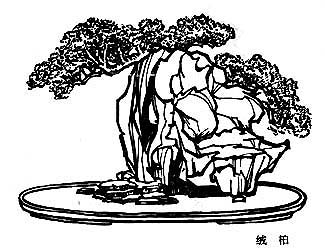Lun Yu 
 – Les Entretiens de Confucius
– Les Entretiens de Confucius
Le Maître échange propos, anecdotes, brèves paraboles et maximes avec ses disciples. Tr. Couvreur (fr), Legge (en) et Lau (en).
Lunyu III. 8. (48)
Tzeu hia dit à Confucius : « On lit dans le Livre des Odes : “Un sourire agréable plisse élégamment les coins de sa bouche ; ses beaux yeux brillent d un éclat mêlé de noir et de blanc. Un fond blanc reçoit une peinture de diverses couleurs.” Que signifient ces paroles ? » Le Maître répondit : « Avant de peindre, il faut avoir un fond blanc. » Tzeu hia reprit : « Ces paroles ne signifient-elles pas que les cérémonies extérieures exigent avant tout et présupposent la sincérité des sentiments ? » Le Maître dit : « Tzeu hia sait éclaircir ma pensée. A présent je puis lui expliquer les Odes. » Un homme dont la bouche est élégante et les yeux brillants peut recevoir divers ornements, de même qu'un fond blanc peut recevoir une peinture variée. Les anciens empereurs ont institué les cérémonies afin qu'elles fussent l'élégante expression et comme l'ornement des sentiments du cœur. Les cérémonies présupposent comme fondement la sincérité des sentiments, de même qu'une peinture exige d'abord un fond blanc. (Tchou Hsi)
Couvreur III.8.
Ceremonies are secondary and merely ornamental.
1. Tsze-hsiâ asked, saying, "What is the meaning of the passage – 'The pretty dimples of her artful smile! The well-defined black and white of her eye! The plain ground for the colors?'"
2. The Master said, "The business of laying on the colors follows (the preparation of) the plain ground."
3. "Ceremonies then are a subsequent thing?" The Master said, "It is Shang who can bring out my meaning. Now I can begin to talk about the odes with him."
Legge III.8.
Tzu-hsia asked, 'Her entrancing smile dimpling,
Her beautiful eyes glancing, Patterns of colour upon plain silk. What is the meaning of these lines?' The Master said, 'There is first the plain silk. The colours come afterwards.' 'Does the practice of the rites likewise come afterwards?'
The Master said, 'It is you, Shang, who have thrown light on the text for me. Only with a man like you can one discuss the Odes.'
Lau [3:8]
Pepatah pertanyaan suatu yang bersemi ‘Tertawa penuh arti meniru senyuman berlesung pipi, mata mengharapkan keindahan senyuman berlesung pipi, bersikap datar menjadikan menggantikan berlesung pipi, pembawaannya begitu pula‘.
Suatu pepatah ‘Melukiskan permasalahan/ urusan kemudian bersikap datar. biasanya aturan/ etika urusan nanti‘.
Suatu pepatah ‘Mulai melayani seperti ini pada dunia perdagangan pula, Mulailah dengan secara bersama-sama mengucapkan puisi selamanya‘.
b. Nabi menjawab : "Itulah cara orang menggambar, lebih dahulu didasari putih, lalu dibubuhi warna-warna".
c. Zi-xia bertanya : "Kalau begitu, Tata Susilakah yang didasari (Cinta Kasih) ?"
Nabi menjawab : "Engkaulah Shang yang menyadarkanKu. Sekarang dapat Kuajak engkau merundingkan isi Kitab Sanjak".
うまい話がころげこんできたら、筋が通っているかどうか考えることだ。祭祀(さいし)にさいしては、敬う気持ちを忘れないようにすることだ。喪に服すときは、心から故人を悼むことだ。

Les Entretiens de Confucius – Lun Yu III. 8. (48) – Chinois off/on – Français/English
Alias the Lunyu, the Lun Yü, the Analects, les Entretiens du maître avec ses disciples.
Le Canon des Poèmes, Les Entretiens, La Grande Étude, Le Juste Milieu, Les Trois Caractères, Le Livre des Mutations, De la Voie et la Vertu, 300 poèmes Tang, L'Art de la guerre, Trente-six stratagèmes
Bienvenue, aide, notes, introduction, table.
Index – Contact – Haut de page























